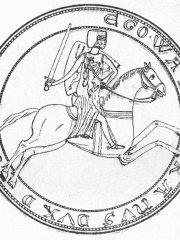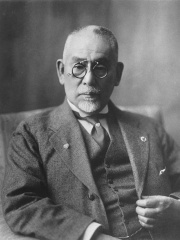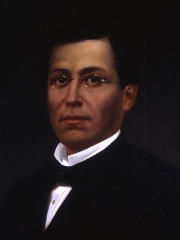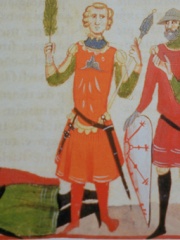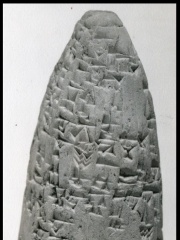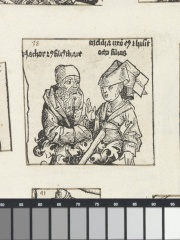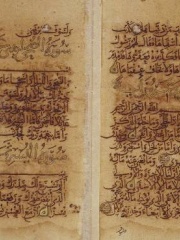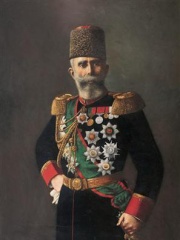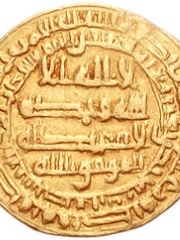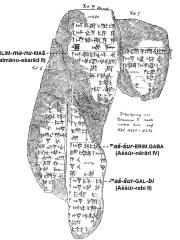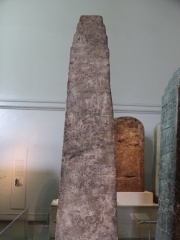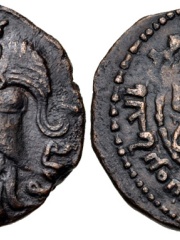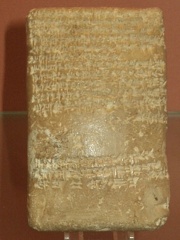Politician
Shu-Sin
EN.WIKIPEDIA PAGE VIEWS (PV)
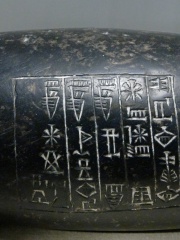
 Shu-Sin
Shu-Sin
His biography is available in 28 different languages on Wikipedia. Shu-Sin is the 9,973rd most popular politician (up from 10,282nd in 2024), the 231st most popular biography from Iraq (up from 248th in 2019) and the 147th most popular Iraqi Politician.
Memorability Metrics
Page views of Shu-Sin by language
Among Politicians
Among politicians, Shu-Sin ranks 9,973 out of 19,576. Before him are Waleran IV, Duke of Limburg, Binyamin Ben-Eliezer, Waiofar, Gotō Shinpei, Nitta Yoshisada, and Ignacio Zaragoza. After him are Frederick II, Duke of Saxe-Gotha-Altenburg, Muhammad Mustafa Mero, Francesc Cambó, Reginald I of Guelders, Khalid al-Azm, and Fyodor Raskolnikov.
Most Popular Politicians in Wikipedia
Go to all RankingsWaleran IV, Duke of Limburg
1300 - 1279
HPI: 61.33
Rank: 9,972
Binyamin Ben-Eliezer
1936 - 2016
HPI: 61.33
Rank: 9,973
Waiofar
800 - 768
HPI: 61.33
Rank: 9,974
Gotō Shinpei
1857 - 1929
HPI: 61.33
Rank: 9,975
Nitta Yoshisada
1301 - 1338
HPI: 61.33
Rank: 9,976
Ignacio Zaragoza
1829 - 1862
HPI: 61.33
Rank: 9,977
Shu-Sin
HPI: 61.32
Rank: 9,978
Frederick II, Duke of Saxe-Gotha-Altenburg
1676 - 1732
HPI: 61.32
Rank: 9,979
Muhammad Mustafa Mero
1941 - 2020
HPI: 61.32
Rank: 9,980
Francesc Cambó
1876 - 1947
HPI: 61.32
Rank: 9,981
Reginald I of Guelders
1255 - 1326
HPI: 61.32
Rank: 9,982
Khalid al-Azm
1903 - 1965
HPI: 61.32
Rank: 9,983
Fyodor Raskolnikov
1892 - 1939
HPI: 61.32
Rank: 9,984
In Iraq
Among people born in Iraq, Shu-Sin ranks 231 out of NaN. Before him are Lipit-Ishtar (-1890), Nahor, son of Terah (null), Ibn al-Bawwab (961), Abu Ibrahim al-Hashimi al-Qurashi (1976), Mahmud Shevket Pasha (1856), and Binyamin Ben-Eliezer (1936). After him are Arik-den-ili (-1400), Gungunum (-1920), Al-Muwaffaq (842), Baha ad-Din ibn Shaddad (1145), Al-Baqillani (950), and Naziha al-Dulaimi (1923).
Others born in Iraq
Go to all RankingsLipit-Ishtar
RELIGIOUS FIGURE
1890 BC - Present
HPI: 61.55
Rank: 225
Nahor, son of Terah
RELIGIOUS FIGURE
HPI: 61.46
Rank: 226
Ibn al-Bawwab
PAINTER
961 - 1022
HPI: 61.46
Rank: 227
Abu Ibrahim al-Hashimi al-Qurashi
EXTREMIST
1976 - 2022
HPI: 61.34
Rank: 228
Mahmud Shevket Pasha
MILITARY PERSONNEL
1856 - 1913
HPI: 61.34
Rank: 229
Binyamin Ben-Eliezer
POLITICIAN
1936 - 2016
HPI: 61.33
Rank: 230
Shu-Sin
POLITICIAN
HPI: 61.32
Rank: 231
Arik-den-ili
POLITICIAN
1400 BC - 1360 BC
HPI: 61.30
Rank: 232
Gungunum
POLITICIAN
1920 BC - 1906 BC
HPI: 61.28
Rank: 233
Al-Muwaffaq
POLITICIAN
842 - Present
HPI: 61.28
Rank: 234
Baha ad-Din ibn Shaddad
HISTORIAN
1145 - 1234
HPI: 61.28
Rank: 235
Al-Baqillani
RELIGIOUS FIGURE
950 - 1013
HPI: 61.28
Rank: 236
Naziha al-Dulaimi
SOCIAL ACTIVIST
1923 - 2007
HPI: 61.23
Rank: 237
Among Politicians In Iraq
Among politicians born in Iraq, Shu-Sin ranks 147. Before him are Shalmaneser II (-1090), Ashurnasirpal I (-1100), Sayf al-Din Ghazi I (1200), Burna-Buriash II (-1400), Nechirvan Barzani (1966), and Binyamin Ben-Eliezer (1936). After him are Arik-den-ili (-1400), Gungunum (-1920), Al-Muwaffaq (842), Abd al-Rahman al-Bazzaz (1913), Ashur-dan I (-1300), and Mohammed Shia' Al Sudani (1970).
Shalmaneser II
1090 BC - 1019 BC
HPI: 61.78
Rank: 141
Ashurnasirpal I
1100 BC - 1060 BC
HPI: 61.76
Rank: 142
Sayf al-Din Ghazi I
1200 - 1149
HPI: 61.74
Rank: 143
Burna-Buriash II
1400 BC - 1400 BC
HPI: 61.65
Rank: 144
Nechirvan Barzani
1966 - Present
HPI: 61.56
Rank: 145
Binyamin Ben-Eliezer
1936 - 2016
HPI: 61.33
Rank: 146
Shu-Sin
HPI: 61.32
Rank: 147
Arik-den-ili
1400 BC - 1360 BC
HPI: 61.30
Rank: 148
Gungunum
1920 BC - 1906 BC
HPI: 61.28
Rank: 149
Al-Muwaffaq
842 - Present
HPI: 61.28
Rank: 150
Abd al-Rahman al-Bazzaz
1913 - 1973
HPI: 61.21
Rank: 151
Ashur-dan I
1300 BC - 1200 BC
HPI: 61.10
Rank: 152
Mohammed Shia' Al Sudani
1970 - Present
HPI: 60.79
Rank: 153
